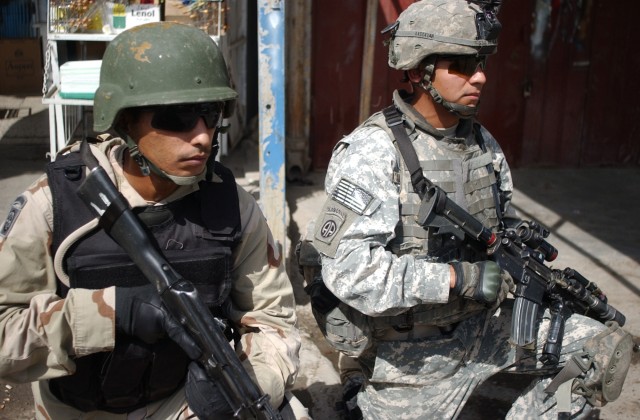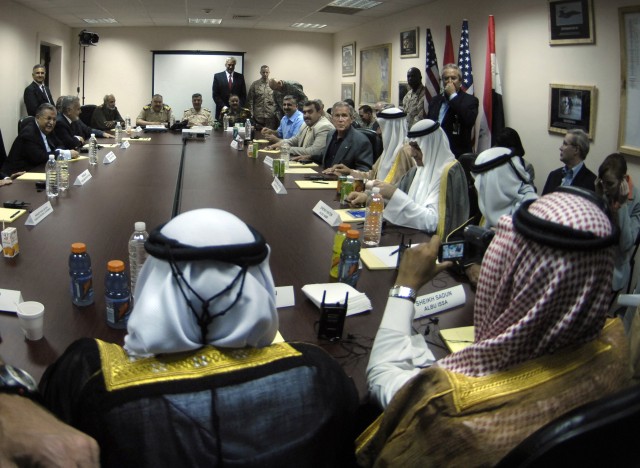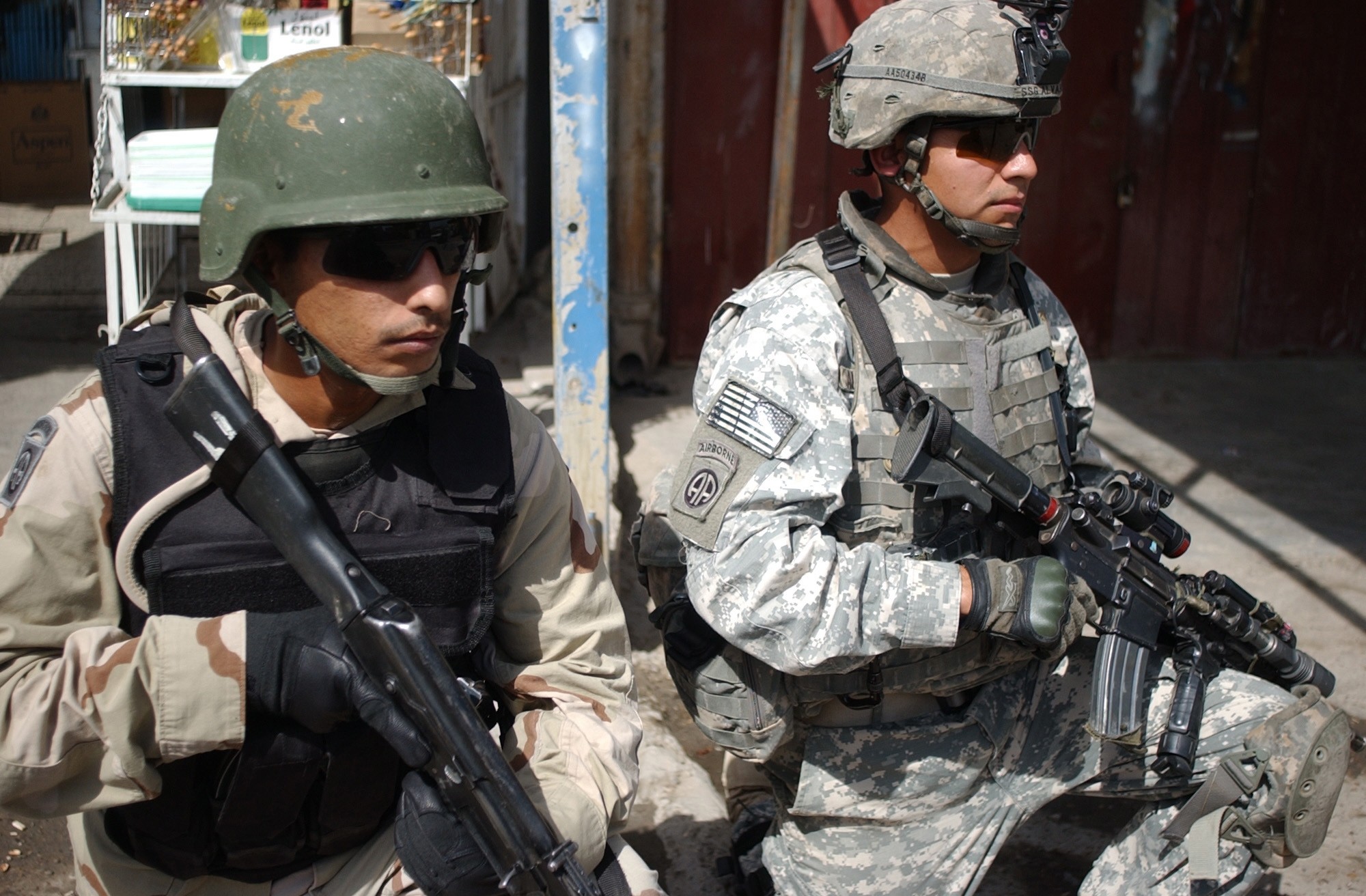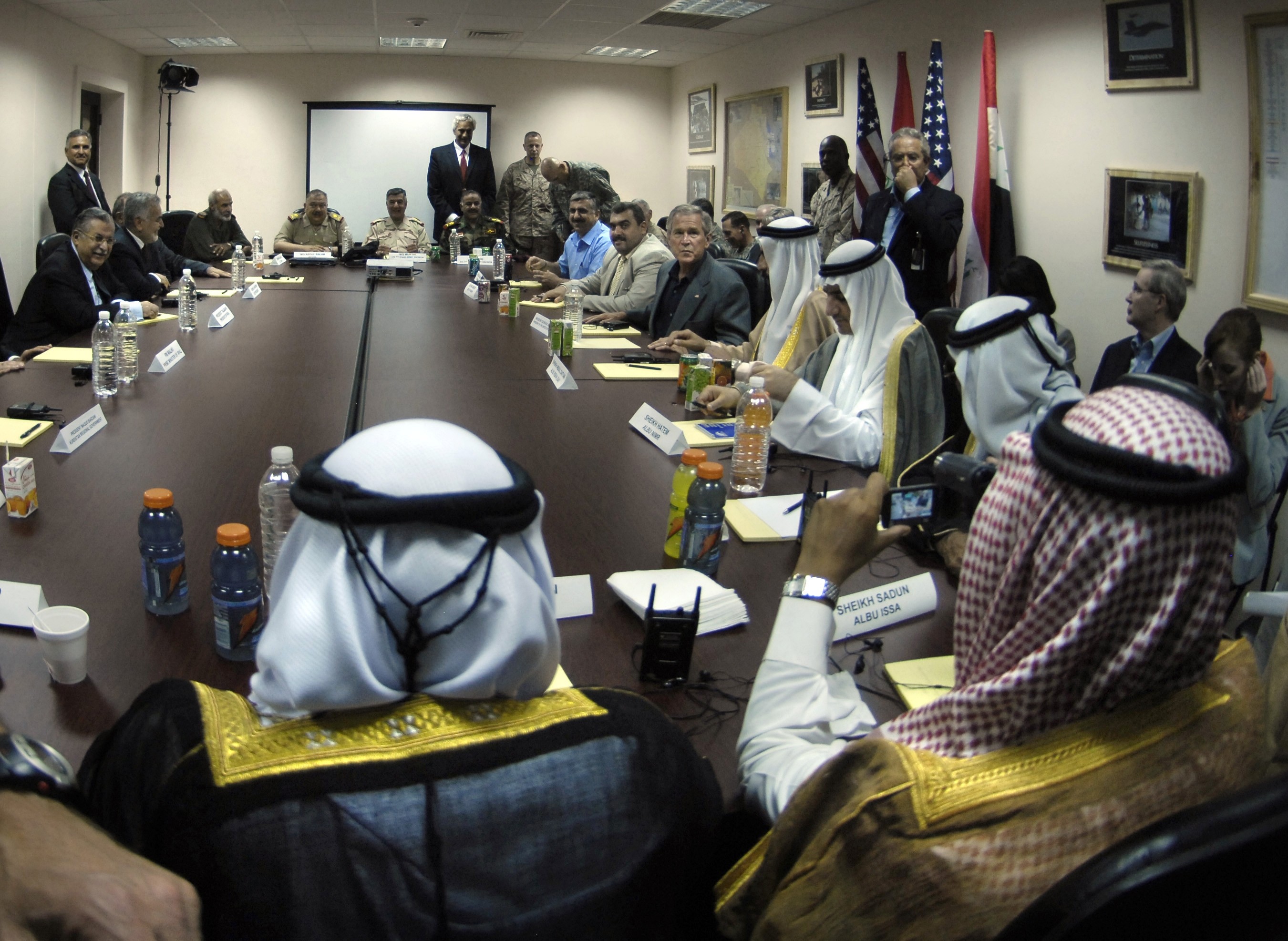WASHINGTON (American Forces Press Service, Sept. 11, 2007) - Gen. David H. Petraeus, commander of Multi-National Force Iraq, told the House Armed Services and Foreign Affairs committees yesterday that coalition and Iraqi forces have made significant security progress since the plus-up began. "As a result, the United States will be in a position to reduce its forces in Iraq in the months ahead," he said.
Gen. Petraeus recommended no replacements for two units that make up the plus-up force: a Marine expeditionary unit to redeploy later this month, and an Army brigade combat to redeploy in mid-December. He also recommended that four additional brigade combat teams and two plus-up Marine battalions redeploy without replacement during the first seven months of 2008.
"Five Army brigade combat teams, a Marine expeditionary unit and two Marine battalions represent a very significant force," he said. "They are the force, in fact, that have helped us substantially in achieving some of the recent gains that our troopers have fought so hard to achieve."
Gen. Petraeus said his proposed timeline for a drawdown of these plus-up forces reflects a careful consideration of conditions on the ground, successes made to date, and what's needed to maintain and build on those successes.
Gen. Petraeus said the plan represents a careful balance of important factors. Among them, he said, is the fact that political progress in Iraq will take place only if there's enough security. Meanwhile, he said, he recognizes that force reductions as the plus-up runs its course will benefit the long-term viability of U.S. ground forces.
In developing his proposal, he said, he factored in operational requirements as well as demands on the force. He said he's "very aware" of strains on the force, particularly among ground troops.
Based on these considerations, Gen. Petraeus said, he and Lt. Gen. Raymond T. Odierno, commander of Multinational Corps Iraq, worked through the "battlefield geometry" to come up with the plan.
"I believe that this is the approach to take to sustain the gains that we have achieved, to build on them, to transition to Iraqi security forces as quickly as we possibly can," he said.
Gen. Petraeus said it's too soon to determine how quickly additional troop reductions can take place.
"I do not believe it is reasonable to have an adequate appreciation for the pace of further reductions and mission adjustments beyond the summer of 2008 until after mid-March of next year," he said.
He cautioned against withdrawing troops too quickly. "There are no easy answers or quick solutions. And though we both believe this effort can succeed, it will take time," he said.
Gen. Petraeus said his assessment underscores the recognition that a premature drawdown of U.S. forces would have devastating consequences.
"Lieutenant General Odierno and I share this assessment," he said. "We believe that the best way to secure our national interests and avoid an unfavorable outcome in Iraq is to continue to focus our operations on security the Iraqi people while targeting terrorist groups and militia extremists, and, as quickly as conditions are met, transitioning security tasks to Iraqi elements."
<b>Hope Amidst Some Setbacks</b>
"While there have been setbacks as well as successes and tough losses along the way, overall, our tactical commanders and I see improvements in the security environment," Gen. Petraeus said. U.S. and Iraqi forces have focused on improving security, especially in Baghdad and the areas around it, wresting sanctuaries from al Qaeda control and disrupting the efforts of Iranian-supported militia extremists, he said.
New practices, including the one in which units now live among the people they are securing, are paying off, Gen. Petraeus told the congressmen. He reported "substantial" progress in expanding previous gains in Anbar province, clearing Baqubah and other key Baghdad neighborhoods and pursuing al Qaeda in the Diyala River Valley and elsewhere.
Also promising, Gen. Petraeus said, is that tribal leaders are beginning to reject al Qaeda. He called this trend, which began in Anbar province and is spreading elsewhere in Iraq, among the most significant development in Iraq in the past eight months.
"Though the improvements have been uneven across Iraq, the overall number of security incidents in Iraq has declined in eight of the past 12 weeks, with the numbers of incidents in the last two weeks at the lowest levels seen since June 2006," he said. Despite reductions in ethno-sectarian violence, Gen. Petraeus conceded it remains at "troubling levels."
The general attributed the decline in violence to "significant blows" that coalition and Iraqi forces have dealt al Qaeda in Iraq. "Though al Qaeda and its affiliates in Iraq remain dangerous, we have taken away a number of their sanctuaries and gained the initiative in many areas," he said.
He expressed confidence in Iraqi security forces as they continue to grow and shoulder more security responsibility. Iraqi elements have been "standing and fighting and sustaining tough losses, and they have taken the lead in operations in many areas," he said.
However, he noted that progress has been slower than hoped, and that, in some cases, sectarianism has appeared within the ranks.
Despite a "complex, difficult and sometimes downright frustrating" situation in Iraq, Gen. Petraeus said he believes it's possible to achieve U.S. objectives there over time. He emphasized, however, that "doing so will be neither quick nor easy."
Competition among ethnic and sectarian communities vying for power and resources remains the fundamental source of the conflict in Iraq, he told the committees. "The question is whether the competition takes place more, or less, violently," he said.
Gen. Petraeus noted that foreign and home-grown terrorists, insurgents, militia extremists and criminals all push ethno-sectarian competition toward violence. Iranian and Syrian influence fuels that violence.
Meanwhile, the general said, lack of adequate governmental capacity, lingering sectarian mistrust and various forms of corruption add to Iraq's challenges.
The general noted that Iraq's army is experiencing a shortage of noncommissioned officers. Often described as "the backbone of the Army," a noncommissioned officer, or NCO, is an enlisted member of an armed force who has been given authority by a commissioned officer. The NCO corps includes corporals and all grades of sergeant.
To mitigate this shortage, the Interior Ministry has offered to employ former military members. Also, Iraq now has four functional military academies.
"The Iraqi military academies -- there are now four of them -- do produce well over a thousand new lieutenants a year now," Gen. Petraeus said. "There is also a junior staff college, senior staff college and a war college. ... They have implemented a number of initiatives to improve the manning of their commissioned and noncommissioned officer corps."
Gen. Petraeus said Iraq's army garners confidence across Iraq's sectarian ties.
"The Iraqi army is still viewed as a national instrument, certainly," the general said. "The citizens again view the army with more confidence than any other Iraqi security force institution."
Gen. Petraeus said his recommendations for the way ahead in Iraq will build on security improvements U.S. and Iraqi forces have fought hard to achieve in recent months. "It reflects recognition of the importance of security to the population and the imperative of transitioning responsibilities to Iraqi institutions and Iraqi forces as quickly as possible," he said.
However, he emphasized, it resists "rushing to failure," emphasizing an ongoing need to support Iraqi security forces' development and highlighting the importance of diplomacy to Iraq's long-term success. He expressed concern that moving too quickly could reverse progress made.
Gen. Petraeus emphasized the key role U.S. troops have played in successes made, calling them the best equipped and most professional force the country has ever seen. "Impressively, despite all that has been asked of them in recent years, they continue to raise their right hands and volunteer to stay in uniform," he said.
Gen. Petraeus told the joint committee he considers it a privilege to lead "America's next greatest generation" in Iraq. "Our country's men and women in uniform have done a magnificent job in the most complex and challenging environment imaginable," he said. "All Americans should be very proud of their sons and daughters serving in Iraq today."
<b>Ambassador Crocker Presents His Report</b>
A secure, stable, democratic Iraq at peace with its neighbors is attainable with "substantial U.S. resolve and commitment," U.S. Ambassador to Iraq Ryan C. Crocker told the House Armed Services and Foreign Affairs committees.
"It is possible for the United States to see its goals realized in Iraq, and that Iraqis are capable of tackling and addressing the problems confronting them today," he said.
"The cumulative trajectory of political, economic and diplomatic developments in Iraq is upward, although the slope of that line is not steep," he said. "This process will not be quick; it will be uneven, punctuated by setbacks and achievements, and it will require substantial U.S. resolve and commitment."
Ambassador Crocker said understanding Saddam Hussein's brutal legacy is indispensable to making a realistic assessment of Iraq's "revolution" and current challenges facing the country. "A new Iraq had to be built almost literally from scratch, and the builders in most cases were themselves reduced to their most basic identity, ethnic or sectarian," he said.
Though Iraqis have made "much progress" forging an institutional framework in the past 18 months, divisive forces during that time have widened fissures between the country's Shiite, Sunni and Kurdish populations. "The sectarian violence of 2006 and early 2007 had its seeds in Saddam's social deconstruction, and it had dire consequences for the people of Iraq, as well as its politics," Ambassador Crocker said, calling Iraq a "traumatized society."
Under this tense backdrop, Iraqis are facing "some of the most profound political, economic, and security challenges imaginable," Ambassador Crocker said.
But despite such challenges, "the seeds of reconciliation are being planted," the ambassador noted.
One example is the central government accepting more than 1,700 young men --including some former insurgents or sympathizers -- from the Abu Ghraib area west of Baghdad as members of Iraq's security forces. The government also has reached out to former military members, offering them retirement pay or jobs in Iraq's burgeoning military or public sector.
The ambassador said signs of political progress occurring at a national level are "neither measured in benchmarks nor visible to those far from Baghdad." Ambassador Crocker cited budding political debates about federalism by Iraqi leaders, including Sunnis. Civic spirit is showing signs of life outside Baghdad, as residents of the Anbar and Salah a-Din provinces are learning to use their political voices to empower their communities, he added.
Ambassador Crocker said there is "palpable frustration in Baghdad" over a resource-sharing system that is complicated by sectarian interests, but that "practical action" to share oil resources and revenues is occurring despite legislation governing such disbursement.
Similarly, because they are imbued with complex sectarian ties, "we should not be surprised or dismayed" that Iraqis have yet to solve issues dealing with de-Baathification reform and provincial powers, Ambassador Crocker said.
"With de-Baathification, Iraqis are struggling to come to terms with a vicious past," he said. "They are trying to balance fear that the Baath party would one day return to power with the recognition that many former members of the party are guilty of no crime and joined the organization not to repress others but for personal survival.
"With provincial powers, Iraqis are grappling with very serious questions about what the right balance between the center and the periphery is for Iraq," Ambassador Crocker continued. "Some see the devolution of power to regions and provinces as being the best insurance against the rise of a future tyrannical figure in Baghdad. Others see Iraq, with its complex demographics, as in need of a strong central authority."
The ambassador said he was encouraged in late August when Iraq's five most prominent national leaders issued a communiquAfA expressing their commitment to working through key issues including de-Baathification and balancing provincial power. Additionally, the leaders publicly stated their desire to develop a long-term relationship with the United States.
Ambassador Crocker cited dramatic security improvements in Iraq, especially in the country's northern and western regions. Six months ago in Anbar province, for instance, violence was rampant with daily attacks against coalition forces.
"But al Qaeda overplayed its hand in Anbar, and Anbar has began to reject its successes -- be they beheading schoolchildren or cutting off people's fingers as punishment for smoking," Ambassador Crocker said. "Recognizing that the coalition would help eject al Qaeda, the tribes began to fight with us, not against us, and the landscape in Anbar is dramatically different as a result."
The ambassador noted that civilians are rejecting extremist ideology and practices, including Shiite extremism, elsewhere in Iraq, in favor of security and diplomatic reforms. "Realizing this vision will take more time and patience on the part of the United States, I cannot guarantee success in Iraq," Ambassador Crocker said.
"I do believe, as I have described, that it is obtainable," he said. "I am certain that abandoning or just drastically curtailing our efforts will bring failure, and the consequences of such a failure ... is an Iraq that falls into chaos or civil war that will mean massive human suffering well beyond what has already occurred within Iraq's borders."




Social Sharing